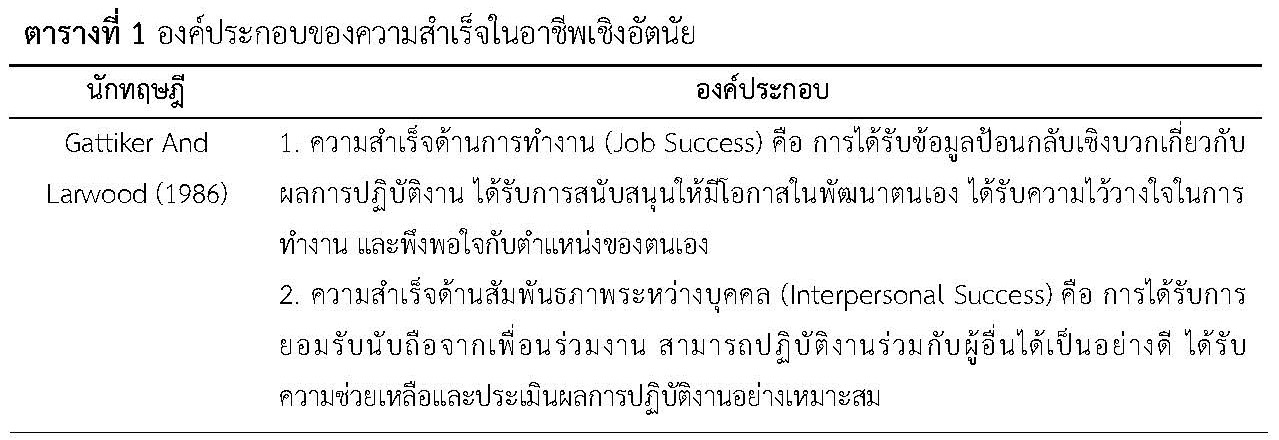Subjective Career Success: Strategies for Nurse Retention
Keywords:
Subjective Career Success, Retention, NurseAbstract
The nursing shortage is an important problem that needs appropriate management strategies. Subjective career success is an important strategy because it reflects the person's perception of their own career success, increases job retention, and decreases the problem of nursing shortages. This article aims to present the concept of subjective career success, its factors, and methods to promote the subjective career success of nurses, which consist of job success, interpersonal success, financial success, hierarchical success, and life success. This is important for nursing administrators to develop the management of nursing personnel in the organization.
References
กฤษดา แสวงดี. (2560). วิกฤติขาดแคลนพยาบาลวิชาชีพในหน่วยบริการสุขภาพของสำนักงานปลัดกระทรวงสาธารณสุข: ข้อเสนอเชิงนโยบาย. วารสารวิชาการสาธารณสุข, 26(2), 456-468.
ชนันท์ธิดา อติชาติ, กุลวดี อภิชาติบุตร และอรอนงค์ วิชัยคำ. (2565). ปัจจัยทำนำยความสำเร็จในอาชีพเชิงอัตนัยของพยาบาลในโรงพยาบาลมหาวิทยาลัย. พยาบาลสาร มหาวิทยาลัยเชียงใหม่, 49(4), 233-247.
สภาการพยาบาล และสำนักงานคณะกรรมการอุดมศึกษา. (2561). โครงการขยายระยะเวลาการเพิ่มการผลิตและพัฒนาการจัดการศึกษา สาขาวิชาพยาบาลศาสตร์ (ปีการศึกษา 2561-2565) เพื่อพัฒนาสุขภาวะ ของประชาชนและตอบสนองยุทธศาสตร์ประเทศระยะที่ 1 (ปีการศึกษา 2561-2562). สืบค้น 17 สิงหาคม 2566 จาก https://nurse.sru.ac.th/wp-content/uploads/2019/05/1โครงการพยาบาลรวม.pdf.
สภาการพยาบาล. (2565). แผนกลยุทธ์การพยาบาลและการผดุงครรภ์ พ.ศ. 2565-2569. นนทบุรี: สำนักพิมพ์สื่อตะวัน.
อัญชลี แก้วสระศรี, รัตนา นิลเลื่อม และชุลีพร หีตอักษร. (2560). การเปลี่ยนแปลงของสังคมและวัฒนธรรมไทยกับแนวโน้มวิชาชีพการพยาบาล. วารสารพยาบาลสงขลานครินทร์, 37(3), 160-169.
Abele, A. E. & Spurk, D. (2009). How do objective and subjective career success interrelate over time? Journal of Occupational and Organizational Psychology, 82(4), 803-824. https://doi.org/10.1348/096317909x470924
Al-Hussami, M., Hammad, S., & Alsoleihat, F. (2018). The influence of leadership behavior, organizational commitment, organizational support, subjective career success on organizational readiness for change in healthcare organizations. Leadership in Health Services (Bradford, England), 31(4), 354-370. https://doi.org/10.1108/lhs-06-2017-0031
Armstrong-Stassen, M., & Ursel, N. D. (2009). Perceived organizational support, career satisfaction, and the retention of older workers. Journal of Occupational and Organizational Psychology, 82(1), 201-220. https://doi.org/10.1348/096317908x288838
Arthur, M., Khapova, S., & Wilderom, C. (2005). Career success in a boundary less career world. Journal of Organizational Behavior, 26, 177-202.
Aryee, S., Chay, Y. W., & Tan, H. H. (1994). An examination of the antecedents of subjective career success among a managerial sample in Singapore. Human Relations, 47(5), 487-509. https://doi.org/10.1177/001872679404700502
Dan, X., Xu, S., Liu, J., Hou, R., Liu, Y., & Ma, H. (2018). Relationships among structural empowerment, innovative behaviors, self-efficacy, and career success in nursing field in mainland China. International Journal of Nursing Practice, 24(5), e12674. https://doi.org/10.1111/ijn.12674
Dyke, L. & Duxbury, L. (2011). The implications of subjective career success. Journal for Labour Market Research, 43(3), 219-229. https://doi.org/10.1007/s12651-010-0044-4
Ellis, R., & Heneman, H. G. (1990). Career pattern determinants of career success for mature managers. Journal of Business and Psychology, 5(1), 3-21.
Gaile, A., Baumane-Vitolina, I., Kivipold, K., & Stibe, A. (2022). Examining subjective career success of knowledge workers. Review of Managerial Science, 16(7), 2135-2160. https://doi.org/10.1007/s11846-022-00523-x
Gattiker, U. E. & Larwood, L. (1986). Subjective career success: A study of managers and support personnel. Journal of Business and Psychology, 1(2), 78-94.
Ingarianti, T. M., Suhariadi, F., Fajrianthi, F., & Kristiana, I. F. (2022). The effect of antecedents of teachers' subjective career success. International Journal of Environmental Research and Public Health, 19(17), 11121. https://doi.org/10.3390/ijerph191711121
International Council of Nurses. (2023). Featuring ICN’s new charter for change. Geneva, Switzerland: Author.
Judge, T. A., Cable, D. M., Boudreau, J. W., & Bretz, R. D. (1995). An empirical investigation of the predictors of executive career success. Personnel Psychology, 48(3), 485-519. https://doi.org/10.1111/j.1744-6570.1995.tb01767.x
Lu, H., Zhao, Y., & While, A. (2019). Job satisfaction among hospital nurses: A literature review. International Journal of Nursing Studies, 94, 21-31. https://doi.org/10.1016/j.ijnurstu.2019.01.011
Mohd Rasdi, R., Ismail, M., & Garavan, T. (2011). Predicting Malaysian managers' objective and subjective career success. The International Journal of Human Resource Management, 22(17), 3528-3549. https://doi.org/10.1080/09585192.2011.560878
Nabi, G. R. (2001). The relationship between HRM, social support and subjective career success among men and women. International Journal of Manpower, 22(5), 457-474. https://doi.org/10.1108/EUM0000000005850
Ng, T. W. H. & Feldman, D. C. (2014). Subjective career success: A meta-analytic review. Journal of Vocational Behavior, 85(2), 169-179. https://doi.org/10.1016/j.jvb.2014.06.001
Pachulicz, S., Schmitt, N., & Kuljanin, G. (2008). A model of career success: A longitudinal study of emergency physicians. Journal of Vocational Behavior, 73(2), 242-253. https://doi.org/10.1016/j.jvb.2008.05.003
Parker, B. & Chusmir, L. H. (1992). Development and validation of a life-success measures scale. Psychological Reports, 70(2), 627-637. https://doi.org/10.2466/pr0.1992.70.2.627
Rudolph, C. W., Lavigne, K. N., & Zacher, H. (2017). Career adaptability: A meta-analysis of relationships with measures of adaptivity, adapting responses, and adaptation results. Journal of Vocational Behavior, 98, 17-34. https://doi.org/10.1016/j.jvb.2016.09.002
Shah, M. (2017). Impact of interpersonal conflict in health care setting on patient care; the role of nursing leadership style on resolving the conflict. Nursing & Care Open Access Journal, 2(2). https://doi.org/10.15406/ncoaj.2017.02.00031
Shockley, K. M., Ureksoy, H., Rodopman, O. B., Poteat, L. F., & Dullaghan, T. R. (2016). Development of a new scale to measure subjective career success: A mixed-methods study. Journal of Organizational Behavior, 37(1), 128-153. https://doi.org/10.1002/job.2046
Simo, P., Enache, M., Sallan, J., & Fernandez, V. (2010). Analysis of the relation between subjective career success, organizational commitment and the intention to leave the organization. Transylvanian Review of Administrative Sciences, 29E, 144-158.
Sonmez, B., Gul, D., Demir, O. I., Emiralioglu, R., Erkmen, T., & Yildirim, A. (2021). Antecedents and outcomes of nurses’ subjective career success: a path analysis. Journal of Nursing Scholarship, 53(5), 604-614. https://doi.org/10.1111/jnu.12660
Steers, R. M. (1991). Introduction to organizational behavior (4th ed.). New York: Harper Collins.
Tamata, A. T. & Mohammadnezhad, M. (2023). A systematic review study on the factors affecting shortage of nursing workforce in the hospitals. Nursing Open, 10(3), 1247-1257. https://doi.org/10.1002/nop2.1434
Taormina, R. J. (2019). Helping shy employees with career success: The impact of organizational socialization. Psychological Thought, 12(1), 41–62. https://doi.org/10.5964/psyct.v12i1.317
Turale, S. (2021). COVID-19: Nursing challenges into the future. Pacific Rim Journal of International Nursing Research, 25(2), 165-170.
World Health Organization. (2020). State of the world’s nursing 2020: Investing in education, jobs and leadership. Geneva: Author.

Downloads
Published
How to Cite
Issue
Section
License
Copyright (c) 2023 Journal of Nursing and Public Health Research

This work is licensed under a Creative Commons Attribution-NonCommercial-NoDerivatives 4.0 International License.
1. บทความหรือข้อคิดเห็นใด ๆ ที่ปรากฏในวารสารวิจัยการพยาบาลและการสาธารณสุข ที่เป็นวรรณกรรมของผู้เขียน บรรณาธิการไม่จำเป็นต้องเห็นด้วย
2. บทความที่ได้รับการตีพิมพ์ถือเป็นลิขสิทธิ์ของ วารสารวิจัยการพยาบาลและการสาธารณสุข








